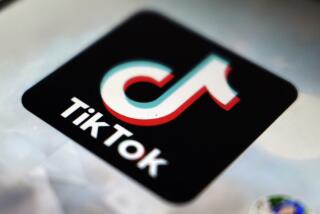Did Quibi steal mobile technology? A rival wants the court to stop it from using ‘trade secrets’
The legal fight over Quibi’s mobile technology escalated on Wednesday as technology company Eko requested an injunction to block Hollywood’s newest streaming service from using a feature on its app.
Eko, a New York-based company, says that Quibi’s app has a feature that uses technology stolen from Eko. The Quibi feature, called “turnstyle,” allows users to toggle their mobile phones vertically and horizontally to gain a different perspective on videos.
Eko sued Quibi for patent infringement and misappropriation of trade secrets last month in federal court in Los Angeles, alleging that Quibi employees had access to Eko’s trade secret technology under nondisclosure agreements.
Quibi is set to launch Monday -- amid the coronavirus lockdown.
And on Wednesday, Eko said it would ask the court to stop Quibi from using Eko’s “trade secret information and from selling, offering for sale, marketing or using the Turnstyle feature.”
“The court papers allege that Quibi not only misappropriated Eko’s proprietary technology, but hid its theft from Eko until making a massive public announcement, which resulted in a litany of media coverage, during a keynote address at the January 2020 CES (trade show), proclaiming it as its own ‘Turnstyle’ technology,” Eko said in a statement on Wednesday.
Eko, also known as New York-based Interlude U.S., is a subsidiary of parent company JBF Interlude Ltd. – Israel.
Quibi has denied wrongdoing and said the technology behind turnstyle is different than what is outlined in Eko’s patent. Quibi had asked a court last month to establish it did not lift Eko technology. Quibi company plans to launch its streaming service on Monday.
“These claims have absolutely no merit and we will vigorously defend ourselves against them in court,” Quibi said.
Quibi, led by its chairman, Jeffrey Katzenberg, and its chief executive, Meg Whitman, a tech industry veteran, is set to launch on Monday with 50 programs. The company has created a streaming subscription service designed for mobile devices, with monthly rates at $4.99 with ads, and $7.99 without ads. Each episode or video chapter on Quibi will be 10 minutes or less.
The company already has some challenges ahead, as more people shelter at home to prevent the rapid spread of the novel coronavirus. Some of Quibi’s productions have been put on hold as a result and the company extended its free trial from initially two weeks to now 90 days.
Katzenberg said in an interview that the streaming service has a large stockpile of content to keep publishing into late October, or possibly as long as Thanksgiving, before Quibi would need to make an adjustment.
Some analysts are skeptical whether consumers would be willing to pay for premium short-form video when apps such as YouTube and TikTok offer large libraries of free, user-generated content. But others believe that as people hunker down at home, that will help draw more customers to Quibi who are looking for new ways to entertain themselves.
More to Read
Inside the business of entertainment
The Wide Shot brings you news, analysis and insights on everything from streaming wars to production — and what it all means for the future.
You may occasionally receive promotional content from the Los Angeles Times.











